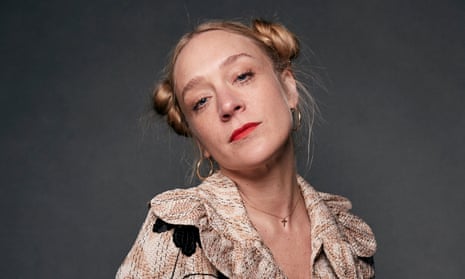Remarkably, given that Chloë Sevigny is still only in her 40s, her work has spanned 30 years. In typical self-deprecating style, she says with a laugh: “I was talking to my manager about my career and I’m just surprised I still have one.”
I am not sure anyone has a career quite like Sevigny’s. She has switched between indie films and sitcoms, taken risky roles and lived a parallel life as a style idol, which has given her a cult celebrity. She has skirted the mainstream for years, never quite becoming a household name. But to some – those who grew up reading the magazines that tracked her years as a 90s cool girl via films such as Kids and Gummo – she is a fashion and arthouse superstar.
We speak on a video call. Sevigny is at home in New York, positioned beneath a reclining female nude by her longtime friend the artist Rita Ackermann. It gives the impression that Sevigny is being birthed by her. She is wearing black and applies a slash of red lipstick before we begin. Somewhere in the background, I can hear her nearly two-year-old son.
In the Netflix show Russian Doll, soon to begin its second series, Sevigny plays the chaotic mother of Natasha Lyonne’s character, Nadia, in flashback. She has known Lyonne – who wrote, co-created and stars in the show – for years and is palpably proud of her friend’s success. The show – which follows Nadia, trapped in a nihilistic time loop – is a riot. “Just watching your friend flourish like that; I’ve always thought she was a genius and I’ve always wanted her to be celebrated,” says Sevigny. “I’m glad that I can contribute in some little way and just be around her, help propel her in any way I can. Or ride her coattails, I’m not sure.”

First, though, in a role that could not be more different, Sevigny plays Lynn, the mother of Conrad Roy, a teenager who kills himself, in The Girl from Plainville. It is based on the real case of Michelle Carter (played by Elle Fanning in the drama), a 17-year-old who was convicted of involuntary manslaughter after encouraging Roy to kill himself in an intense text relationship. She was released from prison in 2020, after serving less than a year. “I remember seeing pictures of the girl and automatically being like: ‘She’s guilty,’ so I’m as complicit as anybody else in vilifying young, beautiful girls,” says Sevigny. “I thought that was interesting, just having the time to really examine the case and look at it from all sides.”
She didn’t meet Lynn, who has since become a campaigner to get Massachusetts to criminalise coerced suicide and make it punishable by up to five years in prison. Sevigny wanted, she says, to “help raise awareness around the issues, destigmatise depression. Also, look at suicide and how it affects families and how far-reaching it is.” The five-month shoot, she says, “was a real exploration of grief and pain. Also, how [Lynn] kind of healed from that and eventually found some peace. It just felt like a very full arc, to really examine how this woman navigated her way through that.”
The Girl from Plainville doesn’t feel exploitative, but how does Sevigny view the appetite for true crime served up as entertainment? “Well, I think it’s case by case. Just look at the way people consume the news – I think there is a little bit of a car-crash culture thing happening. But people are always baffled by what humans are capable of. I think that’s why people keep going back to true crime – and life is stranger than fiction.”
A lot of Sevigny’s roles seem to tap into wider social issues, from Kids (she played an HIV-positive teenager) and Boys Don’t Cry (her Oscar-nominated supporting role, playing the girlfriend of a transgender man) early in her career to, more recently, Luca Guadagnino’s foray into television, We Are Who We Are, which explores teenage angst and edgy family dynamics. “I’m attracted to film-makers that want to examine what’s happening in the culture now,” she says.
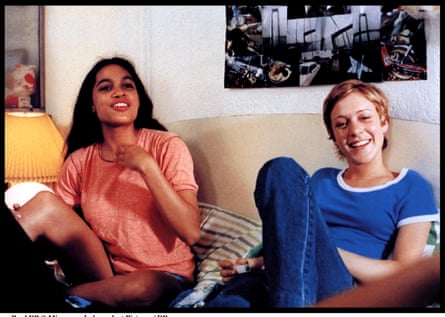
The Sevigny story goes like this: she was plucked from the streets of New York as a teenager, on one of her visits to the city from her home in Connecticut, by a magazine fashion editor who put her in a shoot. She interned at the magazine, got cast in a Sonic Youth video, then got a role on Kids, written for her by her then boyfriend, Harmony Korine. A 6,000-word profile of her in the New Yorker in 1994, written by the novelist Jay McInerney, compared her to Edie Sedgwick; she reluctantly agreed to be the subject of the piece on the condition they got her a pink, latex Helmut Lang dress.
She seems weary of revisiting that time, but humours me. New York was thrilling then, she says – this “burgeoning scene was happening”. Sevigny worked at Liquid Sky, the influential clothing and record store, which became a hangout. “I hate to use the word hipster, but it was the birth of this New York downtown thing. It was a specific 90s time and I had a lot of friends that were in fine art and fashion and movies and music. I felt like I was dipping my toes into all of them.”
Did it feel – with all this sudden attention – that she had the world at her feet? “No!” she says. “Kate Winslet had the world at her feet. I just aspired to be on the cover of the Face [magazine]; I wasn’t going to be in Titanic. My world felt pretty niche and I was OK with that. Like, these are my people, this is where I belong. I wanted to be a character actor.”
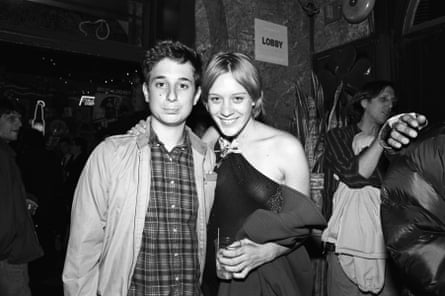
That is why she did Trees Lounge next, she says of Steve Buscemi’s 1996 dive-bar film. “It had all these great character actors in it – I was like: I want this to be my trajectory, I want people to see me as this.” Did she never want to go to Hollywood and become more mainstream? “I mean, now I do,” she says, laughing. “I tried for a while. There was a time when I was leaning into it and playing the game. I don’t know if I was pigeonholed as ‘indie’, or what it was, but I haven’t done a lot of studio pictures.” She adds, smiling: “Yet.”
Anyway, intense fame, she says, didn’t look much fun. In the late 90s, she dated Jarvis Cocker, the Pulp frontman. “He was one of the most famous men in England and I remember being out with him and people chasing us down the street,” says Sevigny. “I was like: wow, I never want this. I think that really informed some of my decisions, seeing what being a really public person entails. Then having to maintain at that level also poses its own challenges – I think that would be kind of stressful.”
Sevigny always seemed to have a clear idea about where she wanted to go, which she credits with reading something the director Werner Herzog said about building a career like a house – I paraphrase, but along the lines of something structurally sound, enduring and where you would feel comfortable living. For Sevigny, this meant embracing interesting work and directors: several times with Jim Jarmusch and Whit Stillman, for instance; Lars von Trier’s Dogville; and even, you might say, the Vincent Gallo film The Brown Bunny (famous for a scene in which Sevigny performs unsimulated oral sex), which, while hated by many critics, gave Sevigny a reputation as fearless.
Did she ever do anything just for the money? “I think I did some nude photos, where you didn’t see my face, for money,” she says, with a smile. “And maybe some Korean advertising.” She could have made other choices, she says, if she just wanted money.
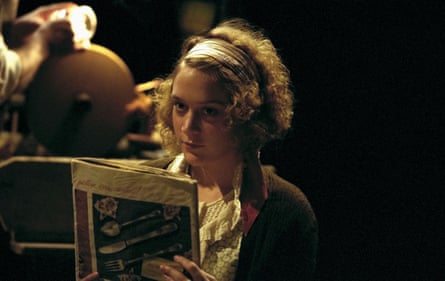
There is something subversive and uncompromising about Sevigny. She never looked like a typical Hollywood star and she remained in New York, rather than moving to Los Angeles. Even when she was being called the coolest girl in the city, she didn’t seem to buy into it entirely; she never seemed aloof. She has had a parallel career in fashion, as a muse to designers such as Marc Jacobs and as a designer of her own collections. She has an experimental approach to dressing that was beloved by the cult magazines, less so by the gossip mags. “There were certain tabloids that targeted me for my style; I was the one that they made fun of,” she says, with a smile.
Perhaps this unconventional approach was cemented in childhood – she grew up in an affluent town in Connecticut, but her family were less well-off than average and she didn’t aspire to the things her classmates did. “I had different interests,” she says. “I was interested in the theatre, in art class, in music. I was more interested in the broader outside world and going to New York and seeing what was happening there.” Her older brother was a big influence. He was “into alternative lifestyle – skateboarding and punk rock and hip-hop – and I wanted to do whatever him and his cool girlfriend that wore Doc Martens and had purple hair were into”.
She knew she wanted to become an actor as a child, ever since her mother had taken her to see Annie on Broadway. When she was spotted later, it wasn’t as if she had been plucked from total obscurity; she had acted in commercials and modelled for Connecticut catalogues – “very regional style stuff”, she says, with a knowing look. (Even so, I can picture the young Sevigny making pastel slacks and knitwear look avant garde.) “I wasn’t that successful at it.”
She had been more successful, she says, at her summer theatre camp, where she was usually in a leading role. But her mother encouraged her to stop traipsing around New York for auditions when she was about 12. “When you’re older,” she remembers her mother saying, “you can see if you want to pursue it professionally again.” So, when Kids happened, in 1995, that was the moment. “It was like: I have this opportunity, I’m going to seriously consider how I strategise.” She says she could be “a little precious”; there were jobs she wishes she had taken, but didn’t, “because I didn’t think they were right for me. That has led me to where I am now, but that could mean [I’m] just overthinking everything.” She laughs at herself.
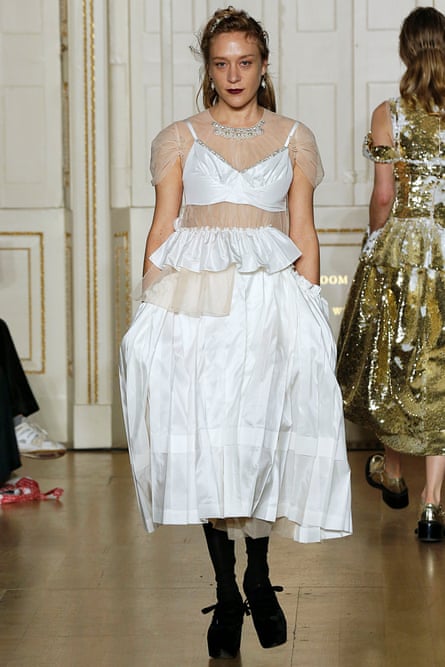
A few years ago, it sounded as if Sevigny had become disillusioned with the way her career was going. “I think that actors are never really satisfied with their careers and maybe I was just a little more vocal about it, maybe in a grasp to be more interesting; I’m not sure,” she says. “I think I was frustrated in giving up control and always giving myself over to other people.” There had been a trend for more dramatic acting, whereas she wanted to do quieter, subtler work. “I’m always frustrated with lack of opportunities, but ask any actor that.” A self-aware smile. “It’s just the actors’ struggle.”
Sevigny turned to directing, which has “been very fulfilling”, she says. So far, she has made three short films – all female-focused – which are fantastical and dreamy, if also melancholy or nightmarish. In her first, which premiered in 2016, a young girl called Kitty metamorphosises into a cat; her third, White Echo, which was selected to compete at Cannes in 2019, is a deeply unsettling film about a group of female friends summoning a spirit.
Her dream, she says, is to direct a feature film, even if at the same time she worries: “Do I have enough passion? Is this the be-all and end-all for me? For me, that has always been friends and family, and now I have a son and a husband. So I’m trying to work back to that passion, because I feel like, to be a film-maker, you really have to be hook, line and sinker.”
Over her career, has she noticed a shift in the sort of opportunities that are available to women? “It feels like it, especially in TV, because when I first started off doing Big Love [the HBO series about a Mormon family], we rarely had a female director. So it feels like there’s a push for that. There are more women in positions of power – producers and directors, showrunners. It feels like a lot of actresses are getting opportunities to [direct] features, and that’s exciting.”
Does it feel like the #MeToo movement has had a big impact? “I feel like there’s a level of – I don’t know if it’s respect, but it did feel like men couldn’t get away with as much any more. Thank God.” Sevigny has said she has been propositioned by men in the industry, but would confidently reject them, while acknowledging that it might have been more difficult for other women to do the same. “I was just never put in a position where I felt like I had to speak out about something,” she says. “Of course, you want to help other women tell their stories, and I want to be there and be supportive of them.”
In 2020, during the lockdown in New York, Sevigny gave birth to her son; a couple of months earlier, she married her partner, a gallerist. Their son’s birth was a strange period, she says – a life-changing moment, coinciding with the world having also changed. “Hard to differentiate. Just having this person around that you just … the love; it’s unbridled, it’s insane. I’m so in love with him and luckily so in love with my husband, and luckily we’ve had a good go of it. I know, for some people, the first year can be hard.” She worries about her son endlessly, she says with a laugh, “and I know that’s just the beginning”.
Her ambition isn’t dimmed. She has been out pitching and developing ideas. “Directing, pursuing [projects]; I want to do that, but I also feel like the formative years are … I mean, it’s my child’s life and I feel like he needs me right now. Just thinking about how I’m going to navigate that is also anxiety-inducing,” she adds, smiling. But her career has been long – and the foundations are solid.
The Girl from Plainville premieres on Hulu in the US on 29 March. It is coming soon to Starzplay in the UK. In the UK and Ireland, the youth suicide charity Papyrus can be contacted on 0800 068 4141 or by emailing pat@papyrus-uk.org. Samaritans can be contacted on 116 123 or by emailing jo@samaritans.org or jo@samaritans.ie. In the US, the National Suicide Prevention Lifeline is at 800-273-8255, or chat for support. You can also text HOME to 741741 to connect with a crisis text line counsellor. In Australia, the crisis support service Lifeline is on 13 11 14. Other international helplines can be found at befrienders.org
